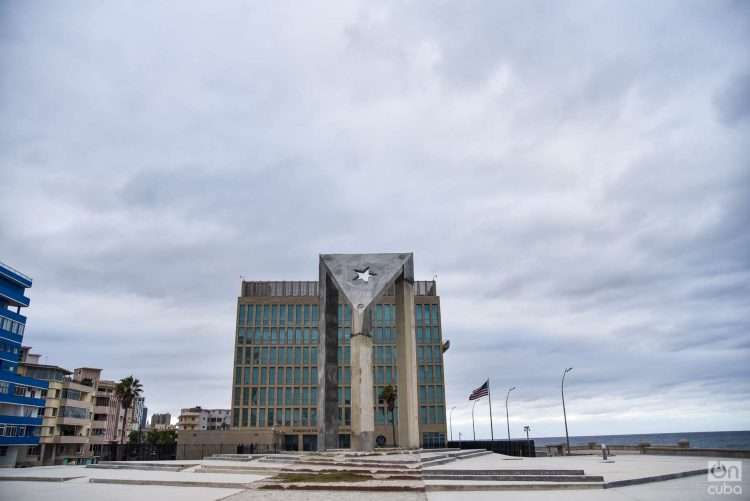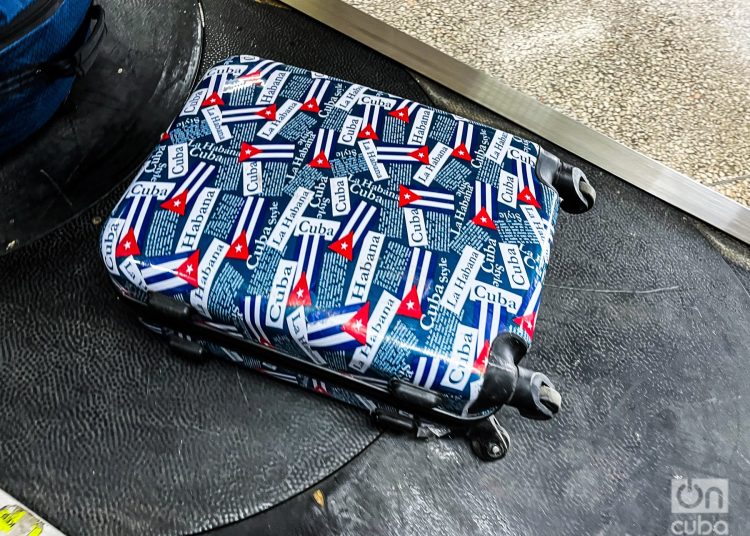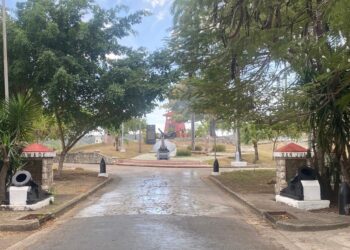My aunt told me that the day after arriving in the United States, she, with her two young children, regretted the decision. She had left with my grandmother on the Varadero-Miami airlift, on what they called “the freedom flights” over there, thanks to the first immigration agreement (1965). She disliked the atmosphere of that city so much that when she was offered to relocate with her family to Los Angeles, she said yes without thinking twice. It was the most tragic moment of her life, she would tell me years later.
In the last decade, Cuban immigration policy took a radical turn compared to the previous fifty years. Those who leave do not lose their rights as citizens, residence, property, or access to social services. They can return, stay as long as they want, leave again, and so on. What was a one-way street has become a roundabout.
In recent times, new regulations have been applied on passport renewal, customs changes to facilitate shipments and imports of medicines and food, meetings of emigrated businesspeople with government authorities, including President Miguel Díaz-Canel.
Today the government affirms that its policy is to facilitate the greater participation of Cubans residing in 130 countries (especially the United States) in our political, economic and social life. And the number of cooperation, business and investment projects presented by these emigrants is growing.
As Ernesto Soberón, in charge of the DACCRE, the department that deals with residents abroad at the Ministry of Foreign Affairs (MINREX) and is organizing the upcoming 4th The Nation and Emigration Conference (November 18-19), told me in a long conversation that 45% of those registered as participants in the event have dual residence, abroad and in Cuba.
Although no less than nineteen years have passed since the Third Conference, he told me that for two years, in November 2021, when the island entered the new normal after the pandemic, the moratorium on the limit of stay outside the country, established in 24 months since 2013, is still in force. “People leave without a limit on their stay abroad.”
4th The Nation and Emigration Conference: resuming dialogue in a different Cuba (I)
Artists have been pioneers in implementing strategies, policies, and decisions that facilitate this link. In recent years, there has been an increase in the participation of artists and intellectuals living abroad in cultural life.
“We are in the best moment of Cuba’s relations with Cubans abroad. Many of their demands have already been met without waiting for the Conference,” Soberón said. And he added: “It will be a moment of balance, but above all of projecting where Cuba’s relationship with the Cubans is going in the coming years.” “We must exchange with them to help show the Cuban reality with its lights and shadows.”
In other texts (“Emigrados nuestros: algunas lecciones orientales” [Our emigrants: some Asian lessons]), I have commented on the policies of China and Vietnam towards their emigrated nationals (“overseas” Chinese or Vietnamese, as they are called). The Nation Front, in Vietnam, and the Council of State Office, in China, represent their interests, institutionally speaking.
I asked Soberón if the institutionalization of that relationship within the Cuban political system has been considered, through an organization or entity that reflects and channels their opinions, interests, needs, while remaining as emigrants.
He answered that a study is being carried out relating to “an institution capable of covering the immigration issue with such breadth through Cubans abroad, which cannot be through the Ministry of Foreign Affairs because the MINREX has no power or authority over local governments nor about the policy followed in culture in relation to emigrants”. “We are analyzing the institutional structure that would correspond to a moment of this nature”; “the subject would also be part of the exchange” at the next Conference.
In addition, he said that “we are in the process of analyzing other bills related to the immigration issue and to Cubans, such as a Migration Law, an Immigration Law, a Citizenship Law,” which the current legislature must discuss.
“We want to exchange some ideas in this regard with the Cubans who come to the Conference, even without there being finished bills in any of the three cases.” When the legislative process advances, “texts of this nature may be subjected to debate with Cubans abroad,” as was done before with the Constitution and the Family Code.
In terms of business, “we have gone from a restrictive policy, let’s say, to a more egalitarian one. We will reach one in which there are particular incentives for Cubans abroad. That also happens through institutionalization.” However, “in the current vision, the capital is what is considered foreign, not the person. They have to have a company abroad with capital abroad, whether Cuban or foreign, and they will be able to invest and do business in Cuba.”
Finally, he added that “we are not going to achieve in two days of work everything that needs to be talked about in terms of Cuba’s relationship with Cubans abroad. Some things will be said there, and others will be discussed in mechanisms to maintain that exchange,” one of “the fundamental functions of the structure that is created: maintaining that exchange.” “Dialogue can be permanent and through different means. Through meetings in countries, regional meetings, actions that are already being held. Through the participation of Cubans in events in Cuba.”
Beyond
Remembering the dialogue with the emigrants, in 1978 and 1979, I commented to the director of DACCRE that Fidel insisted on conceiving it as a separate channel from our relationship with the United States. However, in practice, since the 1980s, some contingencies in relations with that country affected the dialogue with emigrants. To what extent can these relations between Cubans from here and there be separated today from these contingencies?
Soberón mentioned what had been done despite the hostility, after Obama’s short summer, had been renewed. But that total separation of the state from relations with the United States was unlikely. A less hostile U.S. policy would favor our relations with Cubans abroad; and a more hostile one would influence them negatively. In his opinion, however, “there is no way that even very hostile relations will stop them.”

Thinking about problems of greater political importance related to this issue, regardless of what may be discussed at The Nation and Emigration meeting, I came up with some questions focused on three hypotheses.
The first part is to imagine the situation of Cuban émigrés in the United States willing to act politically there and do everything possible to improve relations with Cuba, to the point of achieving a certain normalization, and a stable two-way flow. Considering in this hypothesis that these émigrés did not share socialism or identify with it, but had the will to dialogue and act in favor of the national interest, what political conditions would be necessary for them to feel part and participant in that process? How could those émigrés who do not share political ideas feel committed to the side here, to act in favor of a new relationship? The same, let’s say, as a Mexican, Guatemalan, American, French citizen, who can remain linked to the national interest of their country from abroad? Could they do it, say, in the manner of emigrated artists and writers, who are part of the same organizations as the residents here, and even integrate their governing bodies? Why couldn’t they be part of other organizations and institutions without residing here permanently?
A second question that covers several questions, apparently simpler, would be the following: “My grandfather was the owner of a sugar mill or a factory in Cuba, am I going to be able to invest in that company? Am I going to have a degree of ownership in that old family business again? Are they going to let me do what an Indian, Russian, or Chinese investor does? What percentage of that company can I own? 49%? 70%? 100%?”
Finally, a Cuban residing here, who has not thought about leaving (yet), who has not worried about acquiring another citizenship, would he agree that the answer to the two questions from those emigrants was affirmative? Or rather not? Is it possible to answer them without legislation that is really applied and materialized in policies that delimit equal terms for what Cubans here can and cannot do, that responds to the same right, the same freedom to participate, invest, etc., and its limits?
I have shared these three problems not only with conference organizers but with scholars and experts on the subject. Below are some of their reflections, which I do not quote verbatim, but rather limit myself to paraphrasing, collecting their ideas as I understood them.
***
Despite the unresolved issues, Jesús Arboleya agrees that there has not been a more favorable time than the current one to design a comprehensive policy toward Cuban emigration. It is the most favorable due to the existing consensus in Cuban society. Although national surveys are not available, it seems that the predominant attitude in Cuban society, inside and outside, is much more favorable to this dialogue and meeting than in 1978.
However, when thinking about the participation of emigrants, we cannot ignore the fact that the majority is in the United States and that 62% is concentrated in the state of Florida, one of the most conservative in the history of that country —Arboleya dixit — because it is part of the deep south, beyond Republicans and Democrats.
Cubans arrive in a society that has its rules and are influenced by that environment, where the hard core of counterrevolutionary politics lies, with an assigned function within the United States policy against Cuba. The privileges enjoyed by these emigrants rest on that function. It is difficult to distance oneself from that policy, which is the source of the benefits of access to the political system, and which allows them to influence other issues, not only towards Cuba.
Commenting on what Guillermo Grenier’s polls at FIU demonstrate, Arboleya points out that Cubans do not vote based on the position that the candidates have regarding Cuba; but on the contrary, they assume positions regarding Cuba according to those of those candidates and rulers. Hence, when Obama began normalization, the emigrants mostly opposed the blockade; and when that policy was reversed under Trump, a sizable majority, even among newcomers, favors hostility.
Regarding the political participation of emigrants in Cuba, the expert considers that it is inseparable from their own involvement in the country’s life. He believes that those who live in Miami should not be given the right to vote right now, because it will be controlled by the extreme right that dominates the city’s politics. The United States assigns no similar logic or function to Guatemalan emigrants towards Guatemala, Chileans towards Chile, Mexicans towards Mexico.
However, he agrees that we must work strategically so that all Cubans are equal. What we do regarding emigration has to be the result of the transformation processes within the country. An emigrated Cuban cannot now be authorized to invest in Cuban joint ventures when Cubans here are not authorized to do so.
It is necessary to put all Cubans at the same level and with the same rights. This participation includes the economic relationship, but also being able to study in Cuba, maintaining scientific exchanges with Cuban institutions, and being present in cultural life. As the internal political debate expands, and is reflected in our press in that way, many of those who live outside will fit into it.
Regarding the normalization of access to the emerging economy between outsiders and insiders, Antonio Aja thinks the same. He argues that the political participation of emigrants here can only occur through politics, communication and education. Educating means to stop talking about migration in other parts of the world as if nothing similar happened in Cuba; so that all the children and grandchildren of Cubans, here and abroad, understand this process, can participate and transform it.
To do so, Aja says that it is necessary to understand how intransigence is reproduced in new generations, not only over there but also here. Particularly, around the immigration issue, and also among younger people, even with access to decision-making and debates at higher levels. This resistance is manifested despite the fact that the changes in the relationship with emigrants are dictated by the Constitution itself, which does not make differences between citizens depending on where they reside.
Regarding the political culture of the emigrants, he finally adds, it should not be forgotten that some have left here with political wounds, whose breeding ground is regenerated there, particularly in the United States, but also in other parts of the world, and that have been inferred by a policy towards emigration that has excluded those who leave.
After this accumulation of questions about relations between Cubans here and there, I suspect that pragmatists and doctrinaires would not only have other answers but perhaps some of my inquisitions would seem absurd, simple, or incorrect. I could tell them that they are right (pragmatic or doctrinal), or that I am used to such criticisms, because I come across them often, given that interrogations and questions are part of my job.
But since the more traditional Asian culture is in fashion, I limit myself to closing (for now) this topic with a Chinese proverb: “Ask what you don’t know and you will look like a fool for a few minutes. Don’t ask, and you will be a fool for the rest of your life.”










